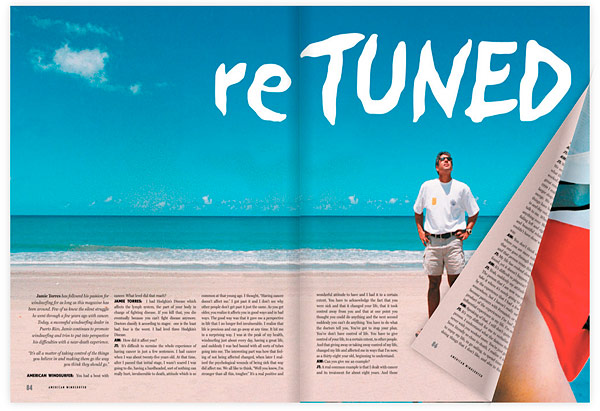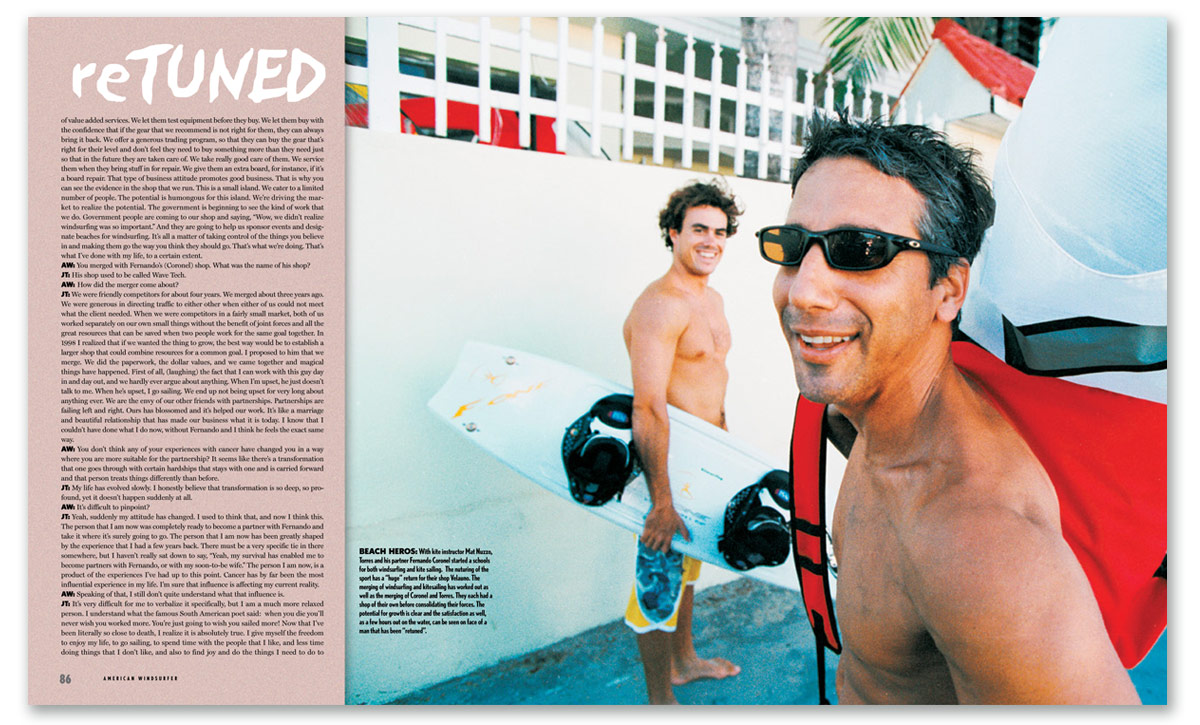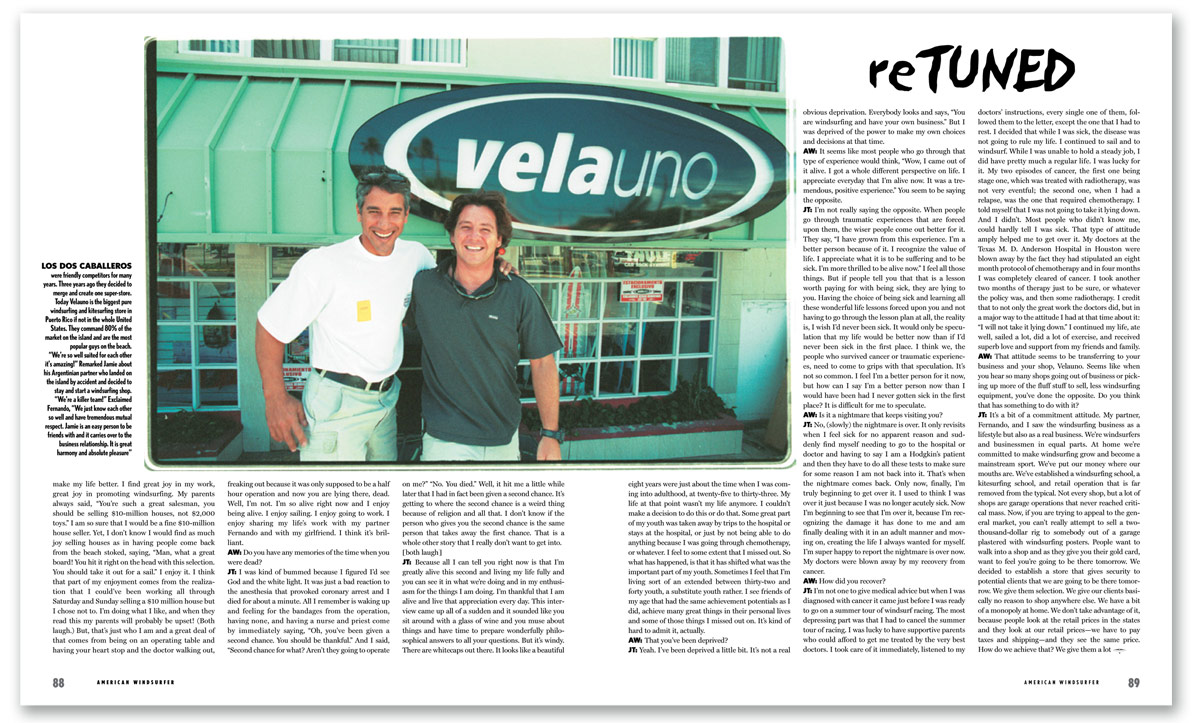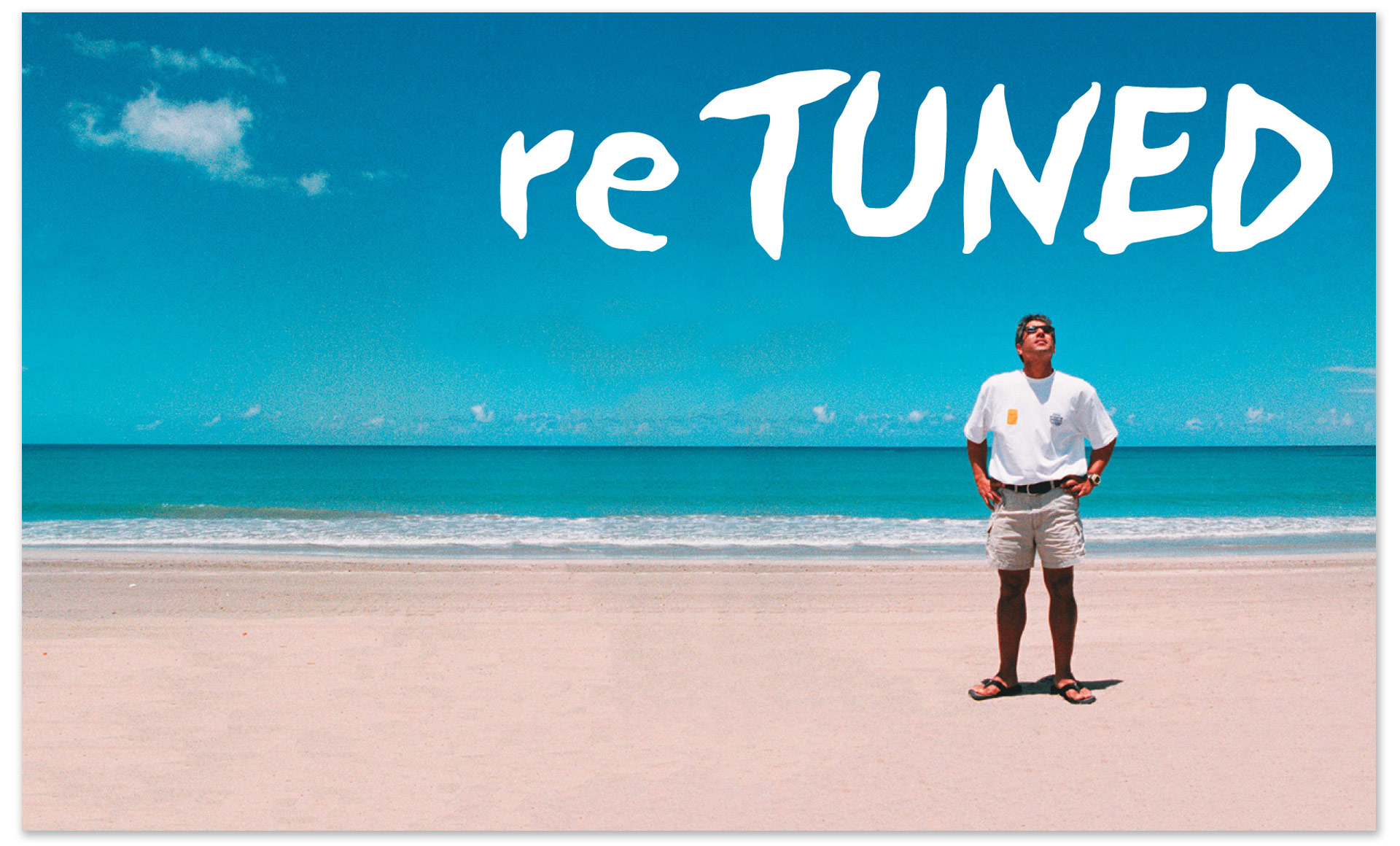FINDING PEACE: Having the best years of his youth taken away by cancer, Jamie Torres has found peace under the sun. The experience of facing death has flamed his passion for the sport and provided a measuring stick for the important things in life. Today he is completely free of the disease and has resumed his passion for windsurfing with a vengeance. He stands on the beach in Isla Verde, Puerto Rico.

Jamie Torres has followed his passion for windsurfing for as long as this magazine has been around. Few of us knew the silent struggle he went through a few years ago with cancer. Today, a successful windsurfing dealer in Puerto Rico, Jamie continues to promote windsurfing and tries to put into perspective his difficulties with a near-death experience.
“It’s all a matter of taking control of the things you believe in and making them go the way you think they should go.”
American Windsurfer: You had a bout with cancer. What level did that reach?
Jamie Torres: I had Hodgkin’s Disease which affects the lymph system, the part of your body in charge of fighting disease. If you kill that, you die eventually because you can’t fight disease anymore. Doctors classify it according to stages: one is the least bad; four is the worst. I had level three Hodgkin’s Disease.
AW: How did it affect you?
JT: It’s difficult to surmise the whole experience of having cancer in just a few sentences. I had cancer when I was about twenty-five years old. At that time, after I passed that initial stage, I wasn’t scared I was going to die, having a hardheaded, sort of nothing can really hurt, invulnerable to death, attitude which is so common at that young age. I thought, “Having cancer doesn’t affect me.” I got past it and I don’t see why other people don’t get past it just the same. As you get older, you realize it affects you in good ways and in bad ways. The good way was that it gave me a perspective in life that I no longer feel invulnerable. I realize that life is precious and can go away at any time. It hit me in a surprising way. I was at the peak of my health, windsurfing just about every day, having a great life, and suddenly I was bed bound with all sorts of tubes going into me. The interesting part was how that feeling of not being affected changed, when later I realized the psychological wounds of being sick that way did affect me. We all like to think, “Well you know, I’m stronger than all this, tougher.” It’s a real positive and wonderful attitude to have and I had it to a certain extent. You have to acknowledge the fact that you were sick and that it changed your life, that it took control away from you and that at one point you thought you could do anything and the next second suddenly you can’t do anything. You have to do what the doctors tell you. You’ve got to stop your plan. You don’t have control of life. You have to give control of your life, to a certain extent, to other people. And that giving away or taking away control of my life, changed my life and affected me in ways that I’m now, as a thirty-eight year old, beginning to understand.
Advertisement

BEACH HEROS: with kite instructor Mat Nuzzo, Torres and his partner Fernando Coronel started a schools for both windsurfing and kite sailing. The nurturing of the sport has a “huge” return for their shop Velauno. The merging of windsurfing and kitesailing has worked out as well as the merging of Coronel and Torres. They each had a shop of their own before consolidating their forces. The potential for growth is clear and the satisfaction as well, as a few hours out on the water, can be seen on face of a man that has been “retuned”.
AW: Can you give me an example?
JT: A real common example is that I dealt with cancer and its treatment for about eight years. And those eight years were just about the time when I was coming into adulthood, at twenty-five to thirty-three. My life at that point wasn’t my life anymore. I couldn’t make a decision to do this or do that. Some great part of my youth was taken away by trips to the hospital or stays at the hospital, or just by not being able to do anything because I was going through chemotherapy, or whatever. I feel to some extent that I missed out. So what has happened, is that it has shifted what was the important part of my youth. Sometimes I feel that I’m living sort of an extended between thirty-two and forty youth, a substitute youth rather. I see friends of my age that had the same achievement potentials as I did, achieve many great things in their personal lives and some of those things I missed out on. It’s kind of hard to admit it, actually.
AW: That you’ve been deprived?
JT: Yeah. I’ve been deprived a little bit. It’s not a real obvious deprivation. Everybody looks and says, “You are windsurfing and have your own business.” But I was deprived of the power to make my own choices and decisions at that time.
AW: It seems like most people who go through that type of experience would think, “Wow, I came out of it alive. I got a whole different perspective on life. I appreciate every day that I’m alive now. It was a tremendous, positive experience.” You seem to be saying the opposite.
JT: I’m not really saying the opposite. When people go through traumatic experiences that are forced upon them, the wiser people come out better for it. They say, “I have grown from this experience. I’m a better person because of it. I recognize the value of life. I appreciate what it is to be suffering and to be sick. I’m more thrilled to be alive now.” I feel all those things. But if people tell you that that is a lesson worth paying for with being sick, they are lying to you. Having the choice of being sick and learning all these wonderful life lessons forced upon you and not having to go through the lesson plan at all, the reality is, I wish I’d never been sick. It would only be speculation that my life would be better now than if I’d never been sick in the first place. I think we, the people who survived cancer or traumatic experiences, need to come to grips with that speculation. It’s not so common. I feel I’m a better person for it now, but how can I say I’m a better person now than I would have been had I never gotten sick in the first place? It is difficult for me to speculate.
AW: Is it a nightmare that keeps visiting you?
JT: No, (slowly) the nightmare is over. It only revisits when I feel sick for no apparent reason and suddenly find myself needing to go to the hospital or doctor and having to say I am a Hodgkin’s patient and then they have to do all these tests to make sure for some reason I am not back into it. That’s when the nightmare comes back. Only now, finally, I’m truly beginning to get over it. I used to think I was over it just because I was no longer acutely sick. Now I’m beginning to see that I’m over it, because I’m recognizing the damage it has done to me and am finally dealing with it in an adult manner and moving on, creating the life I always wanted for myself. I’m super happy to report the nightmare is over now. My doctors were blown away by my recovery from cancer.
AW: How did you recover?
JT: I’m not one to give medical advice but when I was diagnosed with cancer it came just before I was ready to go on a summer tour of windsurf racing. The most depressing part was that I had to cancel the summer tour of racing. I was lucky to have supportive parents who could afford to get me treated by the very best doctors. I took care of it immediately, listened to my doctors’ instructions, every single one of them, followed them to the letter, except the one that I had to rest. I decided that while I was sick, the disease was not going to rule my life. I continued to sail and to windsurf. While I was unable to hold a steady job, I did have pretty much a regular life. I was lucky for it. My two episodes of cancer, the first one being stage one, which was treated with radiotherapy, was not very eventful; the second one, when I had a relapse, was the one that required chemotherapy. I told myself that I was not going to take it lying down. And I didn’t. Most people who didn’t know me could hardly tell I was sick. That type of attitude amply helped me to get over it. My doctors at the Texas M. D. Anderson Hospital in Houston were blown away by the fact they had stipulated an eight-month protocol of chemotherapy and in four months I was completely cleared of cancer. I took another two months of therapy just to be sure, or whatever the policy was, and then some radiotherapy. I credit that to not only the great work the doctors did, but in a major way to the attitude I had at that time about it: “I will not take it lying down.” I continued my life, ate well, sailed a lot, did a lot of exercises, and received superb love and support from my friends and family.
AW: That attitude seems to be transferring to your business and your shop, Velauno. Seems like when you hear so many shops going out of business or picking up more of the fluff stuff to sell, less windsurfing equipment, you’ve done the opposite. Do you think that has something to do with it?
JT: It’s a bit of a commitment attitude. My partner, Fernando, and I saw the windsurfing business as a lifestyle but also as a real business. We’re windsurfers and businessmen in equal parts. At home, we’re committed to making windsurfing grow and become a mainstream sport. We’ve put our money where our mouths are. We’ve established a windsurfing school, a kitesurfing school, and retail operation that is far removed from the typical. Not every shop, but a lot of shops are garage operations that never reached critical mass. Now, if you are trying to appeal to the general market, you can’t really attempt to sell a two-thousand-dollar rig to somebody out of a garage plastered with windsurfing posters. People want to walk into a shop and as they give you their gold card, want to feel you’re going to be there tomorrow. We decided to establish a store that gives security to potential clients that we are going to be there tomorrow. We give them selection. We give our clients basically no reason to shop anywhere else. We have a bit of a monopoly at home. We don’t take advantage of it because people look at the retail prices in the states and they look at our retail prices—we have to pay taxes and shipping—and they see the same price. How do we achieve that? We give them a lot of value added services. We let them test equipment before they buy. We let them buy with the confidence that if the gear that we recommend is not right for them, they can always bring it back. We offer a generous trading program so that they can buy the gear that’s right for their level and don’t feel they need to buy something more than they need just so that in the future they are taken care of. We take really good care of them. We service them when they bring stuff in for repair. We give them an extra board, for instance, if it’s a board repair. That type of business attitude promotes good business. That is why you can see the evidence in the shop that we run. This is a small island. We cater to a limited number of people. The potential is humongous for this island. We’re driving the market to realize the potential. The government is beginning to see the kind of work that we do. Government people are coming to our shop and saying, “Wow, we didn’t realize windsurfing was so important.” And they are going to help us sponsor events and designate beaches for windsurfing. It’s all a matter of taking control of the things you believe in and making them go the way you think they should go. That’s what we’re doing. That’s what I’ve done with my life, to a certain extent.

LOS DOs CABALLEROS were friendly competitors for many years. Three years ago they decided to merge and create one super-store. Today Velauno is the biggest pure windsurfing and kitesurfing store in Puerto Rico if not in the whole United States. They command 80% of the market on the island and are the most popular guys on the beach. “We’re so well suited for each other it’s amazing!” Remarked Jamie about his Argentinian partner who landed on the island by accident and decided to stay and start a windsurfing shop. “We’re a killer team!” Exclaimed Fernando, “We just know each other so well and have tremendous mutual respect. Jamie is an easy person to be friends with and it carries over to the business relationship. It is great harmony and absolute pleasure”
AW: You merged with Fernando’s (Coronel) shop. What was the name of his shop?
JT: His shop used to be called Wave Tech.
AW: How did the merger come about?
JT: We were friendly competitors for about four years. We merged about three years ago. We were generous in directing traffic to either other when either of us could not meet what the client needed. When we were competitors in a fairly small market, both of us worked separately on our own small things without the benefit of joint forces and all the great resources that can be saved when two people work for the same goal together. In 1998, I realized that if we wanted the thing to grow, the best way would be to establish a larger shop that could combine resources for a common goal. I proposed to him that we merge. We did the paperwork, the dollar values, and we came together and magical things have happened. First of all, (laughing) the fact that I can work with this guy day in and day out, and we hardly ever argue about anything. When I’m upset, he just doesn’t talk to me. When he’s upset, I go sailing. We end up not being upset for very long about anything ever. We are the envy of our other friends with partnerships. Partnerships are failing left and right. Ours has blossomed and it’s helped our work. It’s like a marriage and beautiful relationship that has made our business what it is today. I know that I couldn’t have done what I do now, without Fernando and I think he feels the exact same way.
AW: You don’t think any of your experiences with cancer have changed you in a way where you are more suitable for the partnership? It seems like there’s a transformation that one goes through with certain hardships that stay with one and is carried forward and that person treats things differently than before.
JT: My life has evolved slowly. I honestly believe that transformation is so deep, so profound, yet it doesn’t happen suddenly at all.
AW: It’s difficult to pinpoint?
JT: Yeah, suddenly my attitude has changed. I used to think that, and now I think this. The person that I am now was completely ready to become a partner with Fernando and take it where it’s surely going to go. The person that I am now has been greatly shaped by the experience that I had a few years back. There must be a very specific tie in there somewhere, but I haven’t really sat down to say, “Yeah, my survival has enabled me to become partners with Fernando, or with my soon-to-be wife.” The person I am now is a product of the experiences I’ve had up to this point. Cancer has by far been the most influential experience in my life. I’m sure that influence is affecting my current reality.
AW: Speaking of that, I still don’t quite understand what that influence is.
JT: It’s very difficult for me to verbalize it specifically, but I am a much more relaxed person. I understand what the famous South American poet said: when you die you’ll never wish you worked more. You’re just going to wish you sailed more! Now that I’ve been literally so close to death, I realize it is absolutely true. I give myself the freedom to enjoy my life, to go sailing, to spend time with the people that I like, and less time doing things that I don’t like, and also to find joy and do the things I need to do to make my life better. I find great joy in my work, great joy in promoting windsurfing. My parents always said, “You’re such a great salesman, you should be selling $10-million houses, not $2,000 toys.” I am so sure that I would be a fine $10-million house seller. Yet, I don’t know I would find as much joy selling houses as in having people come back from the beach stoked, saying, “Man, what a great board! You hit it right on the head with this selection. You should take it out for a sail.” I enjoy it. I think that part of my enjoyment comes from the realization that I could’ve been working all through Saturday and Sunday selling a $10 million house but I chose not to. I’m doing what I like, and when they read this my parents will probably be upset! (Both laugh.) But, that’s just who I am and a great deal of that comes from being on an operating table and having your heart stop and the doctor walking out, freaking out because it was only supposed to be a half hour operation and now you are lying there, dead. Well, I’m not. I’m so alive right now and I enjoy being alive. I enjoy sailing. I enjoy going to work. I enjoy sharing my life’s work with my partner Fernando and with my girlfriend. I think it’s brilliant.
Advertisement
AW: Do you have any memories of the time when you were dead?
JT: I was kind of bummed because I figured I’d see God and the white light. It was just a bad reaction to the anesthesia that provoked coronary arrest and I died for about a minute. All I remember is waking up and feeling for the bandages from the operation, having none, and having a nurse and priest come by immediately saying, “Oh, you’ve been given a second chance. You should be thankful.” And I said, “Second chance for what? Aren’t they going to operate on me?” “No. You died.” Well, it hit me a little while later that I had in fact been given a second chance. It’s getting to where the second chance is a weird thing because of religion and all that. I don’t know if the person who gives you the second chance is the same person that takes away the first chance. That is a whole other story that I really don’t want to get into.
[both laugh]
JT: Because all I can tell you right now is that I’m greatly alive this second and living my life fully and you can see it in what we’re doing and in my enthusiasm for the things I am doing. I’m thankful that I am alive and live that appreciation every day. This interview came up all of a sudden and it sounded like you sit around with a glass of wine and you muse about things and have time to prepare wonderfully philosophical answers to all your questions. But it’s windy. There are whitecaps out there. It looks like a beautiful day for sailing. I’m pretty psyched right now. It’s awesome that we are here in this situation.


